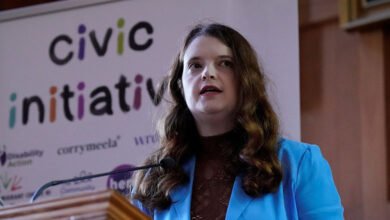Wallace Browne MLA
Wallace Browne became Lord Browne of Belmont in July 2006, before he was elected as a DUP Member to the Assembly in 2007. He was previously a school teacher at Rainey Endowed School and at Knockbreda High School. A councillor for Belfast’s Victoria area since 1985, he is a member of the DUP central executive and also a trustee of the Somme Association.
How and why did you get in politics?
Politics was always in my blood and I really followed in the footsteps of my late grandfather, who was chief reporter on the News Letter, and also became the editor of Hansard and later Deputy Speaker of the original Northern Ireland Senate. After graduating from Queen’s, I entered the teaching profession and in 1979 I joined the DUP East Belfast Westminster Constituency Association. Six years later I was elected to represent the Victoria ward on Belfast City Council. In 2002 I was appointed High Sheriff of Belfast and was also Lord Mayor of the city in 2005.
Has your previous experience as a teacher helped you in any way in your time in politics?
That’s difficult to answer as there are no specifics really. In general I have found the communication skills, which I acquired as a school teacher, have been extremely useful in my various public representative roles.
Is there anything you think is particularly unique about East Belfast?
I am very proud to have had the privilege of representing the people of East Belfast for more than 20 years and while there is no better city to live in, there is no better constituency to represent than East Belfast.
I believe strongly that area’s traditional values and heritage should be preserved. I am also a trustee of several local community associations in East Belfast and am convinced that their voluntary work plays a vital role in maintaining social cohesion and preventing vandalism and crime.
The welfare of the people of East Belfast has been my primary concern throughout my political career. I think the decision made by Ikea to locate a new superstore at Holywood Exchange on the outskirts of East Belfast shows the importance of the area, and has provided much needed local employment.
There is a hard-working ethos and an innate resilience in the people of East Belfast. Indeed because of that I believe that East Belfast will emerge confidently from the current economic difficulties.
How often do you take your seat in the House of Lords?
Wednesday and Thursday are set aside each week to allow me to take my seat in the Lords, paying particular attention to legislation which applies to Northern Ireland.
A quick glance at my appointments diary demonstrates that a career in politics is not a nine-to-five job but requires a fulltime commitment. A typical week would be Monday and Tuesday at the Assembly in Stormont with the next two days being spent in at Westminster. On Thursday, I sit on the Assembly Culture, Arts and Leisure Committee and on Friday I attend a weekly clinic held in the new DUP advice centre on the Holywood Road to deal with the day to day problems of my constituents.
Do you have any highlights from the Lords so far?
My main highlight in the Lords was the day I was introduced to the House in July 2006 by two senior peers, Lord Molyneaux of Killead and Lord Rana. During the swearing in ceremony, when I had to take the royal oath, I was accompanied by Black Rod and the Garter.
Before being entitled to vote each lord has to make a maiden speech. Accordingly I made my maiden speech during the same week as the Queen’s Speech to Parliament, with over 500 peers in attendance. I had been informed by the Chief Whip that the speech was to be on the topic of defence.
What is the purpose of the DUP Central Executive?
The DUP Central Executive Committee is comprised of delegates, who are full members of the party, elected from constituency associations, university associations and the Young Democratic Unionist Council. The Executive also includes the party leader, the deputy leader and a full member who is also an MP, MLA, MEP or peer. The DUP is constituted in such a way that the members at grassroot level have a major influence on party policies and decisionmaking.
The Central Executive Committee is responsible for the ratification of party policy and the election manifestos, and is required to meet at least four times a year.
What do you do to relax in your free time?
As a trustee of the Somme Association, I take a great deal of enjoyment in making young people aware of the sacrifices of previous generations through exhibitions and seminars at the Somme Centre in Conlig.
I have always had a keen interest in sport and I have helped many local sporting clubs and individuals to secure financial backing. These days I have very little time to participate actively in any sport myself but I still manage to give vocal support from the terraces at Irish League games and Ulster Rugby at Ravenhill from time to time.





